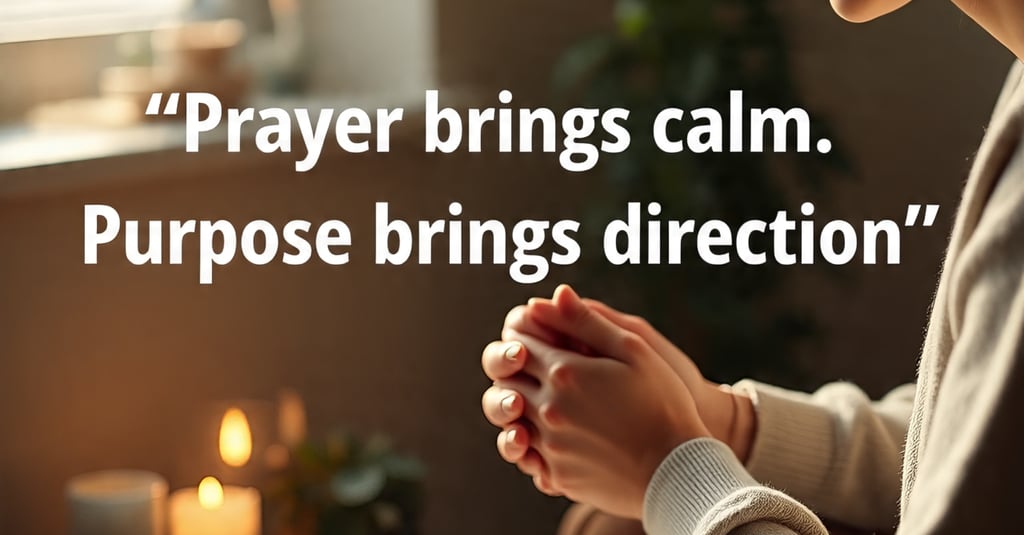The Role of Prayers in Finding Peace and Purpose
Discover how prayer brings peace, healing, and purpose to life. Learn the benefits of daily prayer for inner strength, clarity, and spiritual growth.
Javed Niamt
9/18/20254 min read


The Role of Prayers in Finding Peace and Purpose
In today’s fast-paced world, where stress, uncertainty, and distractions often overwhelm our minds, many people search for ways to find inner peace and direction in life. Among the most powerful and timeless practices that continue to bring comfort and clarity is prayer. Regardless of cultural background, religion, or personal beliefs, prayer holds a universal appeal as a way of connecting with something greater than ourselves. For some, prayer is a spiritual conversation with God; for others, it is a mindful moment of reflection, gratitude, or meditation. Whatever the approach, the role of prayer in finding peace and purpose is undeniable.
Prayer as a Source of Inner Peace
Peace of mind is one of the deepest human desires, and prayer often serves as a direct pathway to this state. When people engage in prayer, they shift their focus from the chaos of external circumstances to a place of stillness. This simple act helps calm the mind, regulate emotions, and reduce stress.
Modern research supports the idea that prayer and meditation can have significant psychological benefits. Studies have shown that prayer lowers anxiety, improves resilience, and even reduces symptoms of depression. When individuals feel overwhelmed by challenges, the act of praying allows them to release their worries and experience relief, knowing they are not alone in their struggles.
For believers, prayer also provides reassurance that God is listening, guiding, and caring for them. This sense of divine connection creates peace even in the most uncertain times. In moments of grief, loss, or fear, prayer acts as a comfort that sustains the human spirit.
Prayer and the Search for Purpose
Finding purpose in life is another universal longing. Without a sense of meaning, people often feel lost, unfulfilled, or directionless. Prayer serves as a tool for reflection and clarity, helping individuals discover or reaffirm their life’s purpose.
Through prayer, people ask for wisdom, guidance, and understanding about their choices, careers, relationships, and personal growth. This spiritual practice creates space for reflection that often leads to insights about who we are and what we are called to do.
In many faith traditions, prayer is seen as a way to align personal desires with divine will. By seeking clarity through prayer, individuals gain a stronger sense of direction and confidence in their decisions. Even for those who are not religious, moments of quiet reflection and gratitude can inspire a renewed sense of purpose and help them recognize what truly matters in life.
The Healing Power of Prayer
Prayer is also a source of healing—emotionally, mentally, and even physically. Many people turn to prayer during sickness or crisis, finding comfort in the hope it brings. The very act of praying cultivates optimism and trust in the possibility of healing and restoration.
Scientific studies have explored the connection between spirituality and well-being, showing that people who engage in regular prayer or meditation often experience lower blood pressure, improved emotional health, and stronger immune systems. This doesn’t mean prayer replaces medical care, but it plays an essential role in holistic healing by reducing stress and promoting a positive outlook.
Building Stronger Connections Through Prayer
Prayer does not only strengthen our inner world but also enhances our connections with others. Family prayers, community worship, or shared meditative practices foster unity and belonging. These collective moments remind us that we are part of something bigger than ourselves.
When people pray for others, they extend compassion, empathy, and love. This act of intercession not only benefits those being prayed for but also enriches the heart of the one praying. By praying for others, people cultivate humility, kindness, and gratitude—values that strengthen relationships and communities.
Different Forms of Prayer for Peace and Purpose
Prayer is not limited to spoken words; it can take many forms, each offering unique ways to experience peace and purpose:
Silent prayer or meditation: Sitting quietly and focusing inward brings calm and mindfulness.
Gratitude prayers: Expressing thanks fosters a positive outlook and reduces stress.
Petition prayers: Asking for help or guidance offers direction and hope.
Intercessory prayers: Praying for others nurtures compassion and strengthens community bonds.
Journaling prayers: Writing thoughts, emotions, and prayers provides clarity and reflection.
Each of these practices can be personalized, making prayer a flexible tool suitable for people from all walks of life.
Incorporating Prayer Into Daily Life
To truly benefit from prayer, consistency matters. Setting aside even a few minutes each day for prayer or reflection can create a lasting impact. Some practical tips include:
Begin and end the day with short prayers or reflections.
Create a quiet space dedicated to prayer or meditation.
Keep a prayer journal to track thoughts, blessings, and answered prayers.
Practice gratitude daily by listing things you are thankful for.
Join a faith community or group for collective prayer and encouragement.
When prayer becomes a regular habit, it nurtures peace, resilience, and a greater sense of life’s purpose.
Conclusion
In a world that often feels chaotic and overwhelming, prayer offers a steady anchor. It allows us to quiet our hearts, release our burdens, and connect to something greater than ourselves. More than just a spiritual ritual, prayer is a lifeline to inner peace, clarity, and direction. Whether spoken aloud, whispered in silence, written in a journal, or shared with others, prayer has the power to heal, inspire, and guide.
Ultimately, the role of prayer in finding peace and purpose is not only about seeking divine answers but also about transforming the way we view life itself. It helps us approach challenges with courage, relationships with compassion, and our journey with meaning. By making prayer a consistent part of our lives, we open ourselves to the peace that sustains us and the purpose that propels us forward.